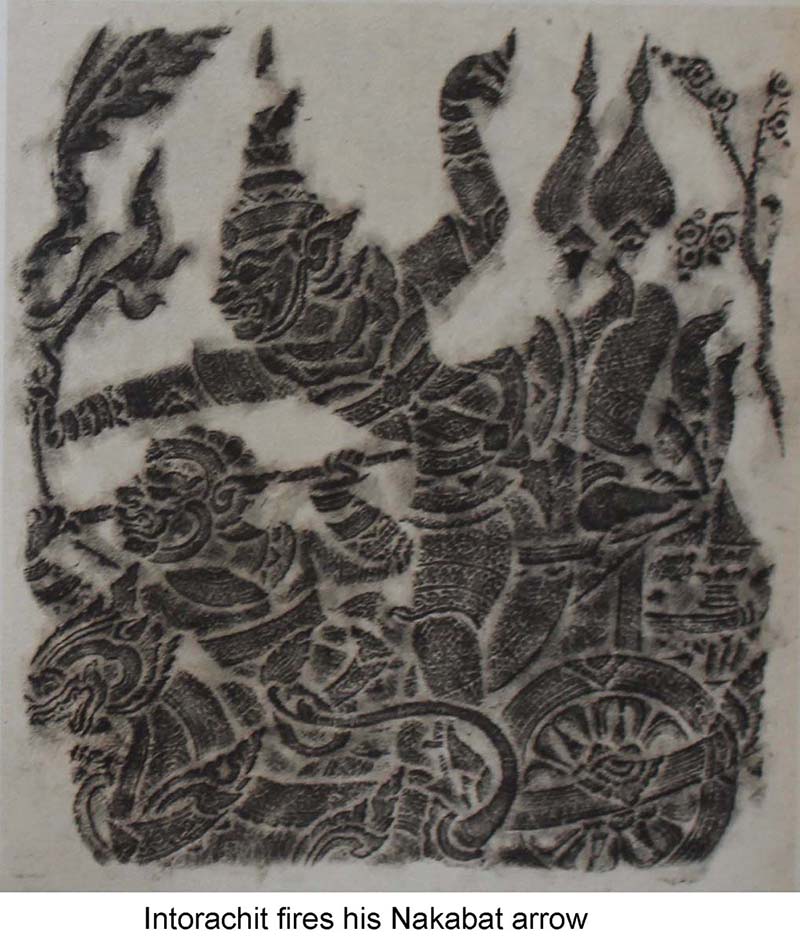|
|
||
|
|
||
|
Determined to turn the tide of the campaign in his favor, Totsakan calls on his mightiest general, none other than his own son by Nang Monto, Intorachit. Up to the present Intorachit has paid little attention to the war, but on being informed of the defeats and losses that Longka has sustained at the hands of Phra Ram, he throws himself on his knees before his father and begs permission to take the field against the invader immediately. Totsagan grants this request gladly. Early in the morning, to the cheers of the citizens and the clamor of rumbling chariots and clashing arms, the demon army sallies forth from Longka, with Intorachit riding at its head. At the same time the monkey army, under the banner of the heavenly bird Krut and led by Phra Ram's royal brother Lak, marches out to oppose it. As the two hosts draw closer, Intorachit picks out his adversary and, having never seen a human being before, marvels at the fairness of skin and beauty of form of Phra Lak. Pitying him, he drives his chariot close to that of Phra Lak and calls to him, "You see before you Intorachit, the conqueror of the god In, the possessor of powers unequaled. In all the heavens I fear only the god Isuan. Take advantage of my clemency; disperse your army and leave the field, for nothing can withstand my magic arrows." But Phra Lak calls out in reply: "I am Phra Lak, brother of the god Narai. We have come to put down the insolent might of the demons. I too have power in my bow. Concede that Totsagan's life is forfeit and save your own." While this parley is being conducted, the restless Hanuman has crept around to the rear of Intorachit's chariot and examined his weapons. Now he prances out in front of the demon and proceeds to mock his brave words. "Who's afraid of those quills you're carrying, demon," he shouts. "Why, there's more might in this old trident of mine than in the combined weapons of your whole army. If you're so smart with a bow, give us a demonstration instead of talking so much." And he leaps up and down and somersaults and cartwheels and performs such antics in front of the demon army that Intorachit, insulted beyond endurance, selects an arrow, draws back his bow and lets fly at the Son of the Wind. The arrows, the original shaft multiplying in flight, sigh like the wind in the trees as they fly and strike Hanuman with enormous force, bowling him head over heels in the dust. Although he is unharmed, for nothing can penetrate his diamond hide or in fact do him any damage at all, the sight of Hanuman laid low by the arrows enrages the monkeys, and they fall on their demon adversaries, slashing, hacking, scratching, biting, gouging and kicking, while the demons respond in their own fashion. The battle rages until nightfall, when both generals break off the conflict and retire to their camps. Many battles follow, none of which is decisive. Intorachit retires from the field, intending to perform rites that will heighten the power of his Nakabat arrow, and while he is absent a number of lesser generals prosecute the war, each succumbing in turn to the monkey army. Nevertheless, Intorachit gains some of the breathing space he requires. He invests his arrow with considerable power, and although one of his commanders, for reasons that will be related later, causes him to break off the ceremony before it is finished, Intorachit returns to the field sure that his shaft will be too strong for the enemy to resist. His confidence is well founded. When the armies are confronting each other once more and battle is about to be joined, Intorachit flies high into the air. Aiming at the monkey ranks, he lets fly his Nakabat arrow, and the air is filled with the hissing of innumerable snakes. |
||
|
|
||




